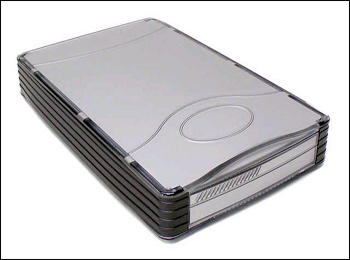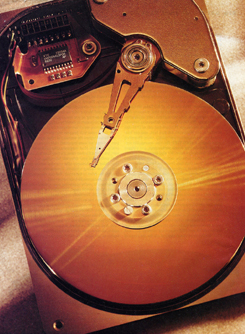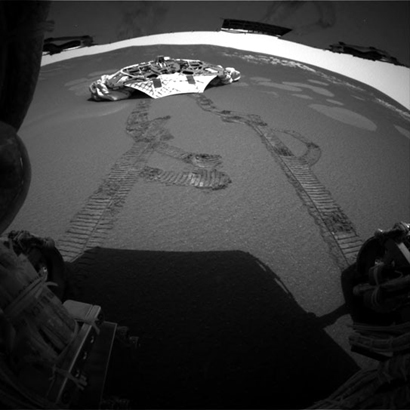
Glenn Reynolds links to Rand Simberg, who has the scoop on Bush's space proposals:
However, there's one little item in the budget also mentioned in Keith's report that, while tiny, may be a portent of huge things to come. The budget of the new Office of Exploration is about a billion dollars (less than 10 percent of the total NASA budget), and buried deep within it is a $20 million line item called "Centennial Challenges."According to the description, the purpose of this is "to establish a series of annual prizes for revolutionary, breakthrough accomplishments that advance exploration of the solar system and beyond and other NASA goals...By making awards based on actual achievements instead of proposals, NASA will tap innovators in academia, industry, and the public who do not normally work on NASA issues. Centennial Challenges will be modeled on past successes, including 19th century navigation prizes, early 20th century aviation prizes, and more recent prizes offered by the U.S. government and private sector."
Key words? "Private sector." It's just a toehold - but in American space exploration, a toehold is the best chance free enterprize has ever had. Excellent work, Mr. Bush.

Last September I raved about a Plug-and-Play external hard drive enclosure made by Taiwanese company Bafo. Make no mistake, I still use two for a rotating backup scheme at the office; but a combination of design flaws and stock shortages have turned me to the Alpha Digital PM-350U2-PCS, pictured above. Refer to the Bafo link for an explanation of what an external enclosure is. The ADI serves its purpose but exceeds the Bafo's performance on four counts. First, connection is problem-free (just make sure you have drivers and the enclosed hard drive jumper is set for Cable Select). Second, the unit is fanless; USB is not the medium for high-usage drives, and so storage operations are better served by the absence of an afterthought component to go on the fritz. Third, because the ADI sports an on/off switch, you can actually control usage of the drive without yanking cables (on that note, one complaint is that the DC input plug fit isn't as snug as I'd like). Fourth, ADI is to be commended for blending utility with style: the enclosure is paneled by plastic-embedded metal. Prime Space Odyssey material. I was disappointed to neither be on a mission to Jupiter nor able to jog around a centrifugal crew cabin.
But it's not my doom. Four Seven viral e-mails have dropped into my inbox over the past twenty-four hours. Killed 'em all.
Manager of entry, descent and landing Rob Manning said it best: "We're on Mars, everybody."
Those who deride NASA as a waste of taxpayer money should keep in mind that the agency does a good job making use of what it receives, even if that means cancelling programs:
NASA has canceled the next service mission for the Hubble Space Telescope, effectively ending Hubble's mission in space after two decades of providing scientists with invaluable photos and data about the universe.John Grunsfeld, chief scientist for the National Aeronautics and Space Administration, said repeatedly Friday that the agency is not killing the Hubble but that it will no longer service the space telescope because of budget problems and safety concerns in the wake of the shuttle Columbia disaster.
Continued service for Hubble would have required expensive updates and testing to the shuttle fleet that are not required for the shuttle's only other job, working on the International Space Station. Those updates arose out of post-Columbia safety concerns: While a damaged shuttle can dock easily with the space station for repairs, there is no such fallback with the Hubble.
"It was a question of looking at the risk elements involved to support the mission," Grunsfeld said. [NASA Administrator] O'Keefe "made the tough decision, and I think it's the right decision."
Of all federal agencies, NASA faithfully operates on a shoestring. One more reason why NASA deserves a little slack - and, on the larger scale, why space exploration belongs in the private sector.
Andrew Sullivan's probably getting some serious reader e-mail. And he passes off to Gregg Easterbrook. Easterbrook's clever, but personally I'm a little hesitant to instantly drop supporting arguments for Bush's proposal to a guy who bought into the plastic turkey myth. And he seems to imply that a program like Apollo took more time to land men on the moon that it actually did.
But let's take Easterbrook's writing at face value: the crafts vital to the missions can't be built within a light year of the budget. Do you know what's likely to happen? The mission is aborted, like many other well-intentioned NASA projects. With America's political climate one of marked ambivalence, Congress wouldn't pass up the chance to rap the space agency on the knuckles and shut (maybe redirect) the greenback spigot. Landing mission over for an administration or two; no exorbitant amount of additional funding allocated. Where's the boondoggle? Where's the dear-God-we've-saddled-our-children shibboleth materializing? Why is a speck in the budget driving Sullivan crazy, when some of us grandchildren can attest to exactly which existing programs' debts have been saddled on us? [Ones that Bush, or anyone else right now, would be tarred and feathered for decentralizing or simplifying!]
And for that matter: what do Easterbrook and Sullivan want? Keep the shuttles cycling? Money's still being spent - and for what, a lot of people have been wondering for years. With Mercury, Gemini and Apollo still vivid in people's minds today, privatization is probably DOA in Congress. Bush deserves at least a mote of credit for seeking some higher aspirations for NASA.
THIS CAN BE DEBATED CALMLY: Stanley Kurtz and Rand Simberg are in disagreement, but it is most definitely, as Kurtz puts it, "thoughtful."
IN ANOTHER WAY: Sullivan gives it one more look, this one without so much fire and brimstone. Fair enough.
Spirit rolls out at 3:00 AM tomorrow morning.
Homer Hickam, on Bush's coming announcement for NASA's new objectives, in the Wall Street Journal:
All I've got to say is please, for pity's sake, stop worrying about NASA stealing money from your favorite federal program and adding to the deficit. Out of a $2 trillion-plus budget in 2004, human resources programs (Education, Health and Human Services, HUD, Labor, Social Security, etc.) will get an astonishing 34%! In contrast, NASA has the smallest budget of all the major agencies in the federal government. In fact, its budget has represented less than 1% of the total budget each year since 1977 and it will probably never get more than a fraction above that, even with this new plan....If the president's space proposals seem overly bold, it's because no president has ever thought it important enough to spend any political capital to see a cogent plan in space all the way through. I don't agree with President Bush about everything but he's starting to remind me of Harry S. Truman. He gets with the program. You can argue with him about what he does and you might even be right, but you can't fault the man for getting out front and leading. That is, after all, what we hire our presidents to do.
Emphasis mine. Were the respondents for a recent poll that illustrates a public ambivalence to space programs told of the infintesimal size of NASA's treasury cut? Of course not. People tend to think a government is spending too much when they haven't the faintest idea how much money is being allocated or where. NASA is doubly cursed: For those that do have an inkling, the intangibles of science frontiers might not stimulate their imaginations as much as frustrate an expectation of money being used for good, solid, concrete things that sit very much on planet Earth, thank you kindly.
Although regulated privatization would, like aviation, produce the best results, the scale of successes achieved by NASA's comparatively small, dedicated staff against its resources, scope of work and inherently dangerous occupation is awing. And its funding remains less than one percent of the budget. Unfortunately, that miracle of public works doesn't make for good politics. So the matter will be hotly debated, occasionally mocked, and for the time being space exploration will - moon/Mars mission or not - stay on the bottom shelf.
SHE BLINDED ME WITH SCIENCE: If NASA is busy sending men to the moon and Mars, it won't be throwing money at the rattletrap space shuttle.
Remember how large hard drives from a few years ago seemed? Remember how expensive they actually were? If Moore's Law tells us everything about the doubling of transistors every eighteen months or so, it at least partially explains the millenarian increase of magnetic platter storage capacity every decade. Ten years ago this April, a computer shopper could purchase hard drive space at one dollar a megabyte. Six years before that, a megabyte was worth fifty bucks. Today, it's a dollar for every gigabyte, something Glenn Reynolds noted yesterday as he marveled at the next metric leap for the consumer market, the terabyte.

I've quoted before from the relevant April 1994 article in PC Computing. Here it is in PDF format, entitled "Big Drives in Tiny Packages." The article's coauthors sandwiched two product roundups between their industry observations. One pits the contemporary top-of-the-line models against one another, the other mid-level performers. The price points - hold onto your hat - were $1000 and $500, respectively. My office has a clutch of old hard drives in our little computer junkyard: one 2GB, one 1GB and one 800MB. I don't think I could buy dinner at a bar-and-grill for their combined street prices.
Wisely, the coauthors were careful not to pontificate, disciplined in sticking to facts and product information - for the most part. Nobody can help themselves from making at least one or two conclusions on value, statements that draw knowing chuckles today. Statements like:
Pentiums galloping at 60MHz. Plenty of elbow room in 64MB of RAM. Sprawling vistas from local-bus video. Looks like the pieces for the ultimate desktop have finally come together...the Pentium, running at twice the speed of most 486 chips, gives weary disk drive developers no time to rest on their laurels.
How the world of technology does - and will continue to - change. Petabyte, anybody?

